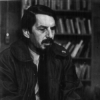Robert Creeley

Robert Creeley
Robert Creeleywas an American poet and author of more than sixty books. He is usually associated with the Black Mountain poets, though his verse aesthetic diverged from that school's. He was close with Charles Olson, Robert Duncan, Allen Ginsberg, John Wieners and Ed Dorn. He served as the Samuel P. Capen Professor of Poetry and the Humanities at State University of New York at Buffalo. In 1991, he joined colleagues Susan Howe, Charles Bernstein, Raymond Federman, Robert Bertholf, and Dennis...
NationalityAmerican
ProfessionPoet
Date of Birth21 May 1926
CountryUnited States of America
He lives out in Orchard Park. I mean, to be able to sit on the bench so patiently, for whatever part, and to be able to get up and do something, with such heroic competencies would be great.
Again like Williams, with the emphasis now regrettable, when a man makes a poem, makes it mind you, he takes the words as he finds them lying interrelated about him.
The irony of our social group is that so often everyone feels this, but there's no company whatsoever in that feeling. Think of Pound's great emphasis, the way out is via the door.
That poetry survived in its formal agencies finally, and that prose survived to get something said.
Don't name it, as they say, because instantly you offer it to this peculiar authority.
And what's fascinating in The Ten Thousand Things is that although there's time, an inexorable time of the three generations of lives, actively present, but place is the time, time doesn't really have to do with simply the human experience of it.
It's the classic story form. All staying equal, or proving equal, or being equal, this will all continue, and the next time around, we'll move on to see what happened to Harry after he dove in the river, or who his friend John really was, and so on.
At least I felt a responsibility for everything that was started. It must have been that New England sense that you've got to finish what you start.
All of which was OK, as that proved then, I certainly wouldn't contradict it as a necessary sense of things.
It's as though all the terms of a family were present at one time rather than his dad and his mum. Not just a present authority, but the resident memory of what qualifies what else is the case.
First you wonder if they're separate stories, but no, they're not, they're contingent stories and they form a pattern. And you begin with some of the island as the place to which the heroine of the book returns.
You were saying that once when visiting Yale, you were struck that unlike Pound, Williams's thinking was volatile, I mean, did not stay locked into a pattern of concepts that then defined his subsequent necessary behavior, whereas Pound did.
Moon, moon, when you leave me alone all the darkness is an utter blackness, a pit of fear, a stench, hands unreasonable never to touch. But I love you. Do you love me. What to say when you see me.
God give you pardon from gratitude and other mild forms of servitude.